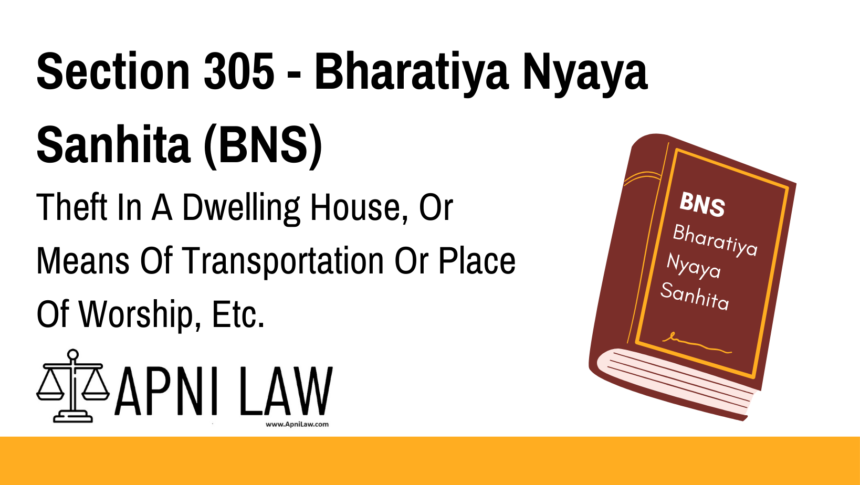Code: Section 305 BNS
Definition and Punishment for Theft in Specific Places
Whoever commits theft—
(a) in any building, tent or vessel used as a human dwelling or used for the
custody of property; or
(b) of any means of transport used for the transport of goods or passengers; or
(c) of any article or goods from any means of transport used for the transport of
goods or passengers; or
(d) of idol or icon in any place of worship; or
(e) of any property of the Government or of a local authority,
shall be punished with imprisonment of either description for a term which may extend to
seven years, and shall also be liable to fine.
Explanation of Section 305 BNS
Section 305 of the Bharatiya Nyaya Sanhita (BNS) deals with theft committed in specific sensitive areas, such as:
- Dwelling places (including buildings, tents, or vessels used for living or safeguarding property),
- Means of transport (for goods or passenger transport),
- Places of worship (specifically targeting theft of idols or icons), and
- Government or local authority property.
The law prescribes a stringent punishment of up to seven years of imprisonment, a fine, or both, recognizing the seriousness of thefts in these critical areas due to their potential to cause emotional distress, loss of public trust, and damage to public or personal property.
Illustration
Example 1: Theft in a Dwelling House
A person breaks into a house to steal valuables while the family is away. This is considered theft under Section 305 BNS, and the offender can be punished with imprisonment for up to seven years and a fine.
Example 2: Theft from a Means of Transport
A thief steals goods from a freight truck parked in a warehouse. This qualifies as theft under Section 305 BNS, as it involves the theft of property from a means of transport.
Example 3: Theft of an Idol from a Place of Worship
A person steals a sacred idol from a temple. This act is covered under Section 305 BNS, considering the religious and cultural significance of the item.
Common Questions and Answers on Section 305 BNS
1. What types of theft are covered under Section 305?
- Answer: Theft in a dwelling house, from means of transport, from places of worship (like idols or icons), and theft of government or local authority property.
2. What punishment can a person face for committing theft under Section 305?
- Answer: The offender can face up to seven years of imprisonment, a fine, or both.
3. Does Section 305 apply if the theft occurs in an unoccupied dwelling?
- Answer: Yes, even if the dwelling is unoccupied, theft in such a place is covered under Section 305.
4. Can theft from a public bus or train be prosecuted under Section 305?
- Answer: Yes, theft from public means of transport used for goods or passenger services falls under this section.
Conclusion
Section 305 of the BNS aims to address thefts that occur in areas of heightened sensitivity, such as homes, religious places, and government property. The law provides for stringent punishments to deter such crimes, acknowledging the significant impact these offenses have on individuals and society. Understanding the provisions of this section helps reinforce the importance of safeguarding critical spaces and assets.











